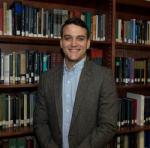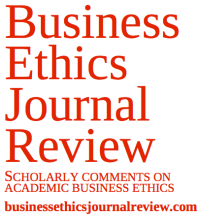v9 n1: Mensch Responds to Raelin on Leadership-as-Practice
Posted: February 12, 2021 Filed under: Uncategorized Leave a comment
The Challenge of Rival Versions of Moral Enquiry Within Leadership-As-Practice, by Kirk Mensch
A RESPONSE TO Joe Raelin (2020), “The Genealogical Ethics of Leadership-as- Practice”, Bus Ethics J Rev 8(5): 27–31 https://doi.org/10.12747/bejr2020.08.05
Abstract: Herein, I clarify my concern regarding Raelin’s Leadership-as-Practice (L-A-P) and argue that inconsistent moral philosophies undermine the veracity of leadership theory, especially more recent democratic, shared, collective, and practice oriented theories; that this problem seems to be proliferating in the social sciences, and that this is especially concerning in socio-psychologically oriented theories. I contend that the moral foundations of L-A-P remain philosophically disquieting, unless it is understood as excluding moral agents other than those of a genealogical tradition, and that such exclusionary consequences in practice may lead to moral disengagement, which might then lead to cognitive dissonance and even self-harm.
To download the full PDF, click here:
Kirk Mensch is a moral psychologist who specializes in understanding the impact of incommensurate moral worldviews on theory, practice, and affiliated agents in pluralistic organizations. Kirk can be reached at https://www.linkedin.com/in/kirkmensch/ or at drkirkmensch@gmail.com
v8 n8: Tomhave and Vopat Respond to Davis on Boycotts
Posted: November 2, 2020 Filed under: Uncategorized Leave a comment

Boycotts and Silencing, by Alan Tomhave and Mark Vopat
A RESPONSE TO Jeremy V. Davis (2020), “Boycotts, Expressive Acts, and Withdrawal of Support”, Bus Ethics J Rev 8(3): 14–19, https://wp.me/p2x7zx-pd
Abstract:
Jeremy Davis offered critical comments on our article that argued some boycotts are pro tanto morally wrong. We argued against organized boycotts over expressive acts where the actor is attempting to engage in the market place of ideas. Davis offered two versions of a direct objection to our position – one that boycotts are not attempts to silence and one that boycotts do not cause a chilling effect – and one objection based on reframing the goals of boycotts. In this Response, we argue that Davis’s direct objections are unsound and his reframing objection is consistent with our initial position.
To download the full PDF, click here:
Alan Tomhave is an Associate Professor of Philosophy and Interim Chair of the Department of Humanities and Social Sciences at Youngstown State University. Mark Vopat is Professor of Philosophy and Co-Director of the Dr. James Dale Ethics Center at Youngstown State University.
v8n7: Strudler on von Kriegstein on Ownership and Shareholder Primacy
Posted: September 1, 2020 Filed under: Uncategorized 1 Comment The Unowned Corporation, by Alan Strudler
The Unowned Corporation, by Alan Strudler
A RESPONSE TO Hasko von Kriegstein (2020), “Shareholder Ownership is Irrelevant for Shareholder Primacy”, Bus Ethics J Rev 8(4): 20–26, https://doi.org/10.12747/bejr2020.08.04
Abstract:
In this response to Hasko von Kriegstein, I defend several claims, including that the publicly-traded corporation and its assets are unowned; that managers may stand in fiduciary relations to shareholders that do not require managers to maximize shareholder wealth; and that the rights of a shareholder and of the owner of a privately-held corporation may differ fundamentally.
To download the full PDF, click here: Strudler Responds to von Kriegstein on Ownership and Shareholder Primacy
Alan Strudler is Professor of Legal Studies and Business Ethics and Professor of Philosophy at the University of Pennsylvania.
v8n6: Forestal and Singer on Social Media and Disinformation
Posted: August 25, 2020 Filed under: Uncategorized Leave a comment
 Social Media Ethics and the Politics of Information, by Jennifer Forestal and Abraham Singer
Social Media Ethics and the Politics of Information, by Jennifer Forestal and Abraham Singer
A COMMENTARY ON Brett Gregory Johnson (2017), “Speech, Harm, and the Duties of Digital Intermediaries: Conceptualizing Platform Ethics,” J Media Ethics 32(1): 16–27.
This commentary is published as part of BEJR’s BUSINESS ETHICS IN TIMES OF PANDEMIC VIRTUAL SYMPOSIUM!
Abstract:
Johnson (2017) conceptualizes the social responsibilities of digital media platforms by describing two ethical approaches: one emphasizing the discursive freedom of platform-users, the other emphasizing protecting users from harmful posts. These competing concerns are on full display in the current debate over platforms’ obligations during the COVID-19 pandemic. While Johnson argues both approaches are grounded in democracy, we argue that democratic commitments transcend the freedom/ harm dichotomy. Instead, a commitment to democracy points toward social media companies’ responsibilities to structure their platforms in ways that facilitate perspectival diversity and collective deliberation.
To download the full PDF, click here: Forestal and Singer on Johnson
Jennifer Forestal is Helen Houlahan Rigali Assistant Professor of Political Science at Loyola University Chicago. Abraham Singer is assistant professor of business ethics at Loyola University Chicago.
v8n5: Raelin on Mensch and Barge on Leadership-as-Practice
Posted: August 12, 2020 Filed under: Uncategorized Leave a comment The Genealogical Ethics of Leadership-as-Practice, by Joe Raelin
The Genealogical Ethics of Leadership-as-Practice, by Joe Raelin
A COMMENTARY ON K. Mensch and J. Barge (2019), “Understanding Challenges to Leadership-as-Practice by Way of Macintyre’s Three Rival Versions of Moral Enquiry,” Bus & Prof Ethics J 38(1): 1–16, https://doi.org/10.5840/bpej2018101273
Abstract:
Mensch and Barge in their interpretation of Alasdair MacIntyre’s critique of genealogical ethics as a basis of ethical weakness in the emerging field of “leadership-as-practice,” suggest that L-A-P is lacking in ethical grounding especially because of its relativist philosophy. I address this valid ethical concern in L-A-P theory by arguing that there is a form of realism in Nietzchean axiology and that the dialogic potentialities in material-social interactions may offer a greater capacity for ethical reflexivity than a reliance on rules.
To download the full PDF, click here: Raelin on Mensch and Barge on Leadership-as-Practice
Joe Raelin is the Donald Gordon Visiting Professor of Leadership, University of Cape Town and The Knowles Chair Emeritus, Northeastern University. He specializes in collective leadership and collective learning. Joe can be reached at: j.raelin@neu.edu
v8n4: von Kriegstein on Ownership and Shareholder Primacy
Posted: August 3, 2020 Filed under: Uncategorized Leave a comment Shareholder Ownership is Irrelevant for Shareholder Primacy, by Hasko von Kriegstein
Shareholder Ownership is Irrelevant for Shareholder Primacy, by Hasko von Kriegstein
A COMMENTARY ON Alan Strudler (2017), “What To Do With Corporate Wealth?” J Poli Philos 25(1): 108–126.
Abstract:
Strudler rejects shareholder primacy and argues that, once contractual obligations have been fulfilled and shareholders have received a reasonable return on investment, corporate executives may use corporate wealth for the general good. He seeks to establish this claim via an argument that, contrary to the received view, shareholders do not own corporations. After raising some questions about the latter argument, this commentary goes on to argue that the question of corporate ownership is a red herring. The argument for shareholder primacy that Strudler wants to reject does not rely on the premise that shareholders own the firm.
To download the full PDF, click here: von Kriegstein on Strudler on Shareholder Ownership and Primacy
Hasko von Kriegstein is Assistant Professor at the Ted Rogers School of Management, Ryerson University.
v8n3: Davis on Tomhave and Vopat on Boycotts and Expressive Acts
Posted: May 18, 2020 Filed under: Uncategorized Leave a comment Boycotts, Expressive Acts, and Withdrawal of Support, by Jeremy V. Davis
Boycotts, Expressive Acts, and Withdrawal of Support, by Jeremy V. Davis
A COMMENTARY ON Alan Tomhave and Mark Vopat (2018), “The Business of Boycotting: Having Your Chicken and Eating it Too,” J Bus Ethics 152: 123–132.
Abstract:
Alan Tomhave and Mark Vopat have argued that organized boycotts against the expressive acts of companies and their leaders are pro tanto morally wrong because they constitute an attempt to silence voices in the marketplace of ideas. I argue that such boycotts are not best viewed as attempts to silence, but rather as a morally permissible form of withdrawal of support of certain expressive acts.
To download the full PDF, click here: Davis on Tomhave and Vopat
Dr. Jeremy Davis is a Visiting Assistant Professor at the United States Military Academy (West Point), with research interests in normative and applied ethics. You can learn more about him at: www.jeremyvdavis.com
v8n2: Sollars and Tuluca Respond to Silver on Portfolio Theory and Shareholder Primacy
Posted: April 8, 2020 Filed under: Uncategorized Leave a comment
 Shareholder Desert Works With a Risk-Return Model, by Gordon G. Sollars and Sorin A. Tuluca
Shareholder Desert Works With a Risk-Return Model, by Gordon G. Sollars and Sorin A. Tuluca
A RESPONSE TO Kenneth Silver (2019), “Modern Portfolio Theory and Share- holder Primacy”, Bus Ethics J Rev 7(6): 34–39, https://doi.org/10.12747/bejr2019.07.06
Abstract:
Kenneth Silver (2019) criticizes our (Sollars and Tuluca 2018) use of the Capital Asset Pricing Model (CAPM) to determine the return on investment that is deserved by shareholders, and suggests shareholder primacy follows from the principal/agent model, rather than a concern for risk. We argue that Silver has misunderstood CAPM and our use of it, and that, under current law, more is required from articles of incorporation or corporate bylaws for the principal/agent model to apply to corporations.
To download the full PDF, click here: Sollars and Tuluca on Silver
Gordon G. Sollars is an associate professor of management in the Silberman College of Business at Fairleigh Dickinson University, with interests in shareholder liability, worker exploitation, and product liability.
Sorin A. Tuluca is a professor of finance in the Silberman College of Business at Fairleigh Dickinson University, with interests in various aspects of corporate finance, corporate governance and interactions between financial markets and real activity.
v8n1: Cohen and Peterson on Heath
Posted: February 5, 2020 Filed under: Uncategorized Leave a commentThe Implicit Morality of the Market Is Consequentialist, by Marc Cohen and Dean Peterson
A COMMENTARY ON Joseph Heath (2019), “Is the ‘Point’ of the Market Pareto or Kaldor-Hicks Efficiency?,” Bus Ethics J Rev 7(4): 21–26, https://doi.org/10.12747/bejr2019.07.04
Abstract:
Joseph Heath states that our paper “misinterpret[s]” and so misrepresents his account. The present Commentary corrects the record. Our paper (Cohen and Peterson 2019) outlined Heath’s account on his own terms; it explained that Heath distances himself from consequentialism. But then we argued that Heath is mistaken and so offered a repaired version of the market failures approach. Our central concern, in the original paper and in this short Commentary, is showing that the economic argument for markets is at the same time ethical, and then being more precise about the ethical consideration that does the work.
To download the full PDF, click here: Cohen & Peterson on Heath
Dean Peterson is an Associate Professor of economics and Associate Director of the University Honors Program at Seattle University. His teaching and research focus on the history of economics.
Marc A. Cohen is an Associate Professor at Seattle University in the Department of Management and the Department of Philosophy.
v7n7: Wells on Hühn & Dierksmeier on What Adam Smith Said
Posted: November 12, 2019 Filed under: Uncategorized Leave a comment What Adam Smith Really Thought Should Not Matter, by T.R. Wells
What Adam Smith Really Thought Should Not Matter, by T.R. Wells
A COMMENTARY ON Matthias Hühn and Claus Dierksmeier (2016), “Will the Real A. Smith Please Stand Up!” J Bus Ethics 131(1): 119–132.
Abstract:
Hühn and Dierksmeier argue that a better understanding of Adam Smith’s work would improve business ethics research and education. I worry that their approach encourages two scholarly sins. First, anachronistic historiography in which we distort Smith’s ideas by making him answer questions about contemporary debates in CSR theory. Second, treating him as a prophet by assuming that finding out what Smith would have thought about it is the right way to answer such questions.
To download the full PDF, click here: Wells on Hühn & Dierksmeier
Thomas Wells is an assistant professor of philosophy at Tilburg University in the Netherlands. His research and teaching focuses on ethics, especially ethical issues in business, capitalism and the methodology of economics.


